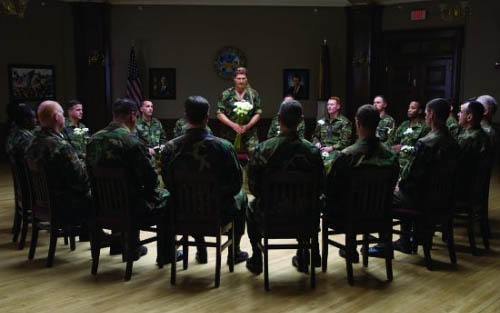Review: The Men Who Stare at Goats

I've watched The Men Who Stare at Goats twice at this point -- once at the Fantastic Fest screening where the film lacked credits and color correction, and once in its final release-ready version. And here's the thing: I enjoyed watching the movie both times, and some moments were truly fantastic ... but the movie does not quite hang together. It may be fun to watch, but overall it doesn't quite work. It's a mystery.
The movie opens with the words "More of this is true than you think" (or something to that extent -- you'd think after two viewings I'd write these details down), and this is not idle boasting. The Men Who Stare at Goats is based on a nonfiction book by Jon Ronson about some odd, New Age-y programs the U.S. military started in the 1980s, and how certain aspects of these programs lingered on and were used by the U.S. in Iraq in this decade. Ronson is in the book only as an interviewer; he doesn't bring much of his personal life into the book.
The movie uses many of the details Ronson imparts in his book, but with fictional characters and a story to provide narrative structure and personal interest. Bob Wilton (Ewan McGregor) is a Midwestern journalist who, spurned by his wife for his editor, decides to go to Iraq in 2002 as a war correspondent. He runs into Lyn Cassidy (George Clooney), whose name Wilton has heard in association with some odd stories about psychic experiments in the military. Cassidy leads Wilton into some strange adventures, while recounting through flashback his experiences in the First Earth Battalion, an military experiment in creating psychic "supersoldiers" headed by Bill Django (Jeff Bridges).
One problem with the movie is that the flashbacks are more interesting than the present-day action. The parts of the movie set in 2002 are not only less interesting, but the rules of this universe are never established. It's inconsistent -- is this a world where psychic powers actually exist? Is it a straightforward depiction of the world as we know it, or is it supposed to be slightly exaggerated and cartoonish? The film never seems to decide. The flashbacks, however, don't have this problem, and are all perfectly consistent.
Another difficulty is with Ewan McGregor. I usually enjoy McGregor's performances -- I even liked him in dreary Amelia, seeming oddly George Sanders-ish at times -- but he is badly miscast in The Men Who Stare at Goats. For one thing, he sounds about as much like a Midwesterner as -- well, as George Sanders would, and he's too urbane to be a small-town reporter. And then there are the Jedi references. McGregor's character is continually making references to Star Wars, or asking what a Jedi Warrior is, and it's difficult not to snicker. The Fantastic Fest audience roared with laughter, and it was impossible to take that dialogue seriously. It pulled me out of the movie every time.
Jeff Bridges, on the other hand, is perfectly cast as Bill Django. The Men Who Stare at Goats may be worth watching just for Bridges. In fact, I might have enjoyed a straightforward narrative about the First Earth Battalion doings, and the interesting relationship between Django and Cassidy, without all the Iraqi War stuff.
I read Jon Ronson's book between my first and second viewings of this film, which caused something else to bug me on the second viewing. In the book, Ronson discovers some unusual interrogation methods being used on prisoners in Abu Ghraib -- repetitively playing children's songs such as the Barney theme, for example. His research on this is very interesting. And when the story breaks in the mainstream media about the Barney theme and interrogation, it's all treated as a big joke ... which causes Ronson to speculate about the use of jokes to brush off and dismiss serious problems. The Barney aspect led to people dismissing discussion about possible torture methods, because it seemed like a joke.
In the movie of The Men Who Stare at Goats, this material is treated in a much less effective way -- in fact, some of it is handled in a very stupid, almost appalling way. And the bit where the mainstream media picks up part of the story never pays off with the same impact as the book. It doesn't work, we don't believe it, and the ending of the movie more or less falls apart.
I can see the possibility of a very good movie in The Men Who Stare at Goats, but the poor structure and inconsistencies prevent it from holding together. I wish it could somehow be re-edited and reshaped into something better ... but thanks to some excellent performances, it's at least one of the most entertaining unsuccessful movies I've ever seen.


Agree, generally, but a thought:
I had the same feelings about the movie: it had some nice moments but it doesn't quite work.
The idea that the modern scenes weren't as cohesive as the historical ones COULD be an intentional commentary on the diminished belief in "magic" from the 70's to now...but I think it's as much unintentional weak writing.